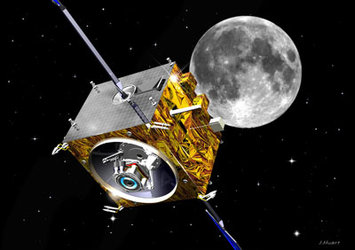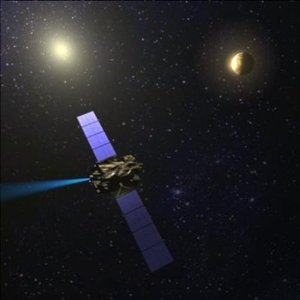Smart approach to the Moon: An interview with Emilie Evrard
SMART-1 is the first of ESA's 'Small Missions for Advanced Research in Technology'. It will soon be heading for the Moon using revolutionary propulsion techniques and carrying a battery of miniaturised instruments. Part of the team responsible for getting those instruments ready is Emilie Evrard.

Emilie Evrard, Engineer (ESA Young Graduate Trainee), SMART-1 project team
Born 8 November 1978 in Reims, France.
Engineering Diploma, Ecole Centrale, Nantes. Post-Masters Degree in Tools and Systems for Astronomy and Space, Observatory of Paris (Paris and Meudon) and the Institut d'Astrophysique Spatiale (Orsay University), France.
In 2002, as ESA trainee on the SMART-1 project, she worked on the Radio Science Investigation (RSIS) experiment. Currently an ESA Young Graduate Trainee, focusing on instruments (calibration, commissioning, simulation behaviour during flight).
In her spare time, Emilie enjoys horse riding, sailing and theatrical work, and recently she has been learning salsa dancing.
ESA: The launch of SMART-1 is coming up very soon. What is the mood of the SMART-1 operations team?
Emilie Evrard
We are all very excited, but we still have some work to do and a few problems to sort out. Things are a bit quieter now, now that the spacecraft tests are over. During the testing period, the team sometimes worked around the clock to do all the tests according to schedule.
One of the most exciting moments was test-firing SMART-1's engine, which we did early one morning. The atmosphere was very tense until the moment the engine fired successfully – then the joy and emotion on people's faces was really moving. I could see that they felt so happy to be working on such a project. Even though they had been working so hard, they still felt it was an honour to be involved.
ESA: Things will get exciting again when SMART-1 is launched. What will you be doing then?
Emilie Evrard
Mainly crossing my fingers for luck! I will be watching the launch live on screen at ESTEC. It will be a big event for me, even though my work doesn't really begin again until later. Just after the launch, I will go to ESOC (the European Space Operations Centre) in Germany, where there will be a lot of work going on. The spacecraft has to send a message back to Earth to confirm that it's working. Once we have made contact, we start the pre-commissioning phase, which means checking that all the instruments on the spacecraft are working correctly.
ESA: This is your first job in space – how has it been so far?
Emilie Evrard
Really great. Ever since I was a teenager, I have been interested in astronomy. When I first arrived at the European Space Research and Technology Centre (ESTEC), I was so impressed with what was here. When I saw a spacecraft close up, I started to think of the journey that it is going to make and it was overwhelming. I've been able to go to conferences given by astronauts, who explain their exciting experiences in space, which is fascinating. Seeing live transmissions of space launches is very exciting too.
This has been strange for me as I'm away from friends and family in France. It's all just such great experience. I've discovered so many new things at once – a new country, a new culture, and also my first working experience.
I've found that there are lots of young people at ESTEC, all of different nationalities, and it turns out they are away from home for the first time too. It's made us become quite close and we spend a lot of time together outside working hours. I also try to go back home several times a year and my family has come to visit me.
ESA: What's it like working with more men than women in the space industry?
Emilie Evrard
Well, I am quite used to it! When I was studying engineering, men outnumbered women by four to one in my year. I think it's quite nice, actually, although it is probably true that women can sometimes get overlooked in the engineering industry. It has never happened to me - here at ESTEC, I feel I am appreciated for who I am. However, I do think it's important to have more women in science. We can bring in something different: we see things differently, and I think it's very important to have that perspective as well.






